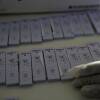Almost 11% of all COVID-19 cases reported throughout the pandemic in Massachusetts were reported in the past week — and that isn’t counting people who tested positive with rapid tests.
The state posted 126,174 positive COVID-19 cases between the reporting dates of Jan. 3 and Jan. 7, representing positive tests collected between Dec. 31 and Jan. 6.
It’s a staggering number that amounts to 10.6% of Massachusetts' total confirmed cases recorded during the entire pandemic, and experts say the figure is certainly an undercount given that the state doesn’t have a system in place to collect data from people who test positive at home.
“If anything, that’s a massive under assessment,” said Mark Siedner, an infectious disease clinician and researcher in the Division of Infectious Diseases at Massachusetts General Hospital.
He explained that positive cases are reported through health care systems, testing centers, school and work programs that have structured reporting systems to the state. The total doesn't include sick individuals who opt not to get tested or positive results from rapid at-home tests, which thousands of Massachusetts residents are turning to out of convenience after long lines at testing centers and hard-to-get test appointments.
“The first step of the pandemic response is to have the data, But this is just one aspect of many in which we are failing,” said Julia Raifman, assistant professor for Boston University School of Public Health.
There is no existing state guidance on how people who test positive at home can report their result, according to multiple experts interviewed on the record and on background by GBH News.
“The raw number of cases is absolutely a cause for concern and there are multiple levels of why that's a concern,” said Carlene Pavlos, executive director of the Massachusetts Public Health Association.
She said long COVID, needing to take time off from work, and the impact that can have on low-wage workers who don’t have a lot — or any — sick time is worth taking into account.
“We know that the vast majority of cases that are testing positive at home are reporting to no one, often even their pediatrician or even their primary care provider,” Pavlos said.
Pavlos recently took two rapid tests at home after a potential COVID-19 exposure, and personally wondered if there was a way she could report her test if it was positive. "I actually explored whether or not I was supposed to report to anybody, and there was no indication that I was supposed to report," she told GBH News.
Pavlos stopped short of recommending what the state should consider doing to make sure people who test positive at home get counted, and said that recommendation should come from the state or the Centers for Disease Control and Prevention.
Omicron cases appear to be less severe than illness caused by other coronavirus variants, and the death and hospitalization rates of infected people have been lower generally. But there are still a butterfly effect of impacts — from long COVID symptoms that can impact patients with even mild coronavirus, to hospital beds filling up from the sheer size of caseloads.
Siedner pointed out that omicron came in the midst of the very long delta wave. “Our hospitals were already nearly full. Even if we think omicron is appearing to be less severe, if it’s half as severe, but four times as many people are infected, We are gonna meet our brink,” he said. Massachusetts General Hospital, he said is nearly full.
“We are going to meet our limit and are not going to be able to provide health care,” he said in a phone interview.
Mass General Brigham itself recently issued an internal guidance to patients on what to do if they test positive, with recommendations on what to do at different severity levels, from mild, to moderate and severe. “You do not need to contact your doctor to let them know you have COVID,” the internal guidance read. The press office referred questions about how this could contribute to an undercount of patients to its internal communications office, which did not respond.
Despite haphazard health system and state advice on what to do if you test positive at home, and incomplete data, Raifman acknowledged that the health care system is stressed, and patients calling in to say they tested positive at home might not be the best way to collect data.
“I would say that doctors are so overwhelmed,” she said. It’s a balance of giving patients guidance on what to do if they test positive, and the importance of collecting good data.
“At this point it becomes about the most important thing we can do in a crisis like this- to reduce the toll. The data would just reveal to us the crisis in front of us,” she said.
Those mitigation efforts, Raifman said, should include the state mandating masks across the board, and municipalities providing free or low cost masks to employees, students and the public.








